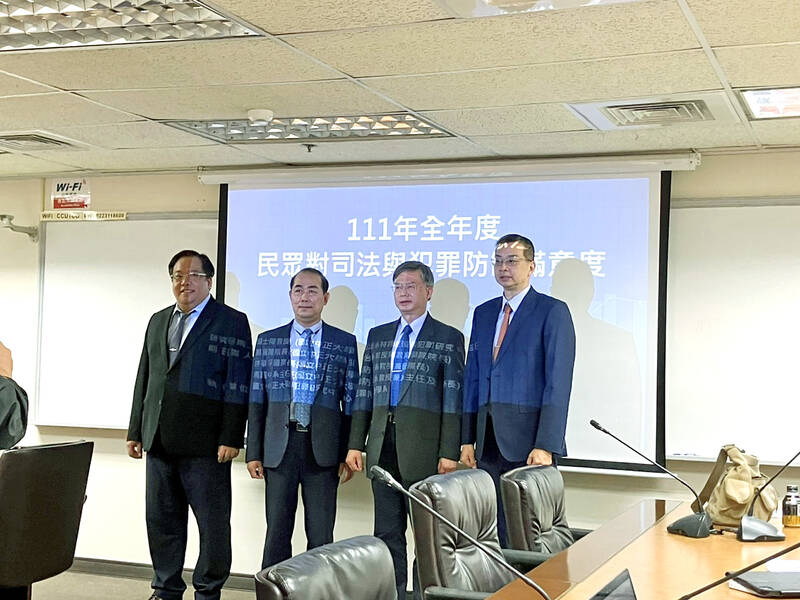More than 73 percent of people approved of law enforcement efforts to safeguard public security, a survey released on Monday by the Crime Research Center at National Chung Cheng University (CCU) showed.
A high 83.1 percent of respondents also gave their stamp of approval to “public safety conditions around their residence and local neighborhoods,” the survey showed.
However, 54.3 percent of respondents said they were not satisfied with government efforts “to strengthen the social safety net,” and only 32.8 percent indicated satisfaction when asked if “judges make fair and rightful rulings on criminal cases.”

Photo: Wang Kuan-jen, Taipei Times
Just a little over the majority, or 55.3 percent, said they were satisfied with the “government’s heavy crackdown on drugs,” while 53.3 percent said they were dissatisfied with “government efforts to crack down on financial fraud and extortion,” researchers at the center said.
The survey showed that 83.6 percent of respondents opposed the decriminalization of cannabis use, while 90.5 percent agreed that people convicted of killing police officers should be sentenced to death, they said.
Ratings on the key indicators of public security dropped compared with a previous survey, although most people still endorsed police efforts to uphold safety in local communities, CCU criminology professor Cheng Jui-lung (鄭瑞隆) said.
“The social safety net is the main underlying structure for maintaining public security, which includes medical, health and public hygiene measures, and mental health and psychological well-being. Given this underlying structure, it is impossible to maintain public security by relying solely on law enforcement by police,” Cheng said.
“Maintaining peace and public safety cannot depend only on police officers combating criminal elements. It also needs the justice system, measures to promote medical health and mental well-being, uphold security in local neighborhoods, and cooperation by a law-abiding public,” he added.
The survey shows that the public wants a more proactive approach and stronger efforts by the government to combat serious crimes, said Ma Yao-chung (馬躍中), head of CCU’s criminology department, adding that “cross-ministerial collaboration is needed to build a more comprehensive social safety net.”
“Government ministries and agencies should coordinate and combine their resources, as well as introduce legislation, to combat fraud,” Ma said.
The government should also step up efforts to search and seize illegal drugs, and its public campaign against their use, he added.
In combating fraud, identity theft has become a major problem, Ma said, suggesting that stealing a person’s identity and setting up fake bank accounts should be defined as a separate offense and that corresponding punishments be meted out.
If imposing a steep fine as an administrative penalty has no deterrent effect, criminal prosecution could be the next step, he said.
One option would be to introduce legislation that would fine offenders NT$1 million (US$33,096) to discourage fraud rings and reduce the numbers of victims of bank fraud, he added.
Cheng said that while the public response to the question on judges’ ability to make fair rulings appeared to be low at 32.8 percent, it was an improvement from the 18 percent it garnered from a poll conducted 10 years earlier.
The survey was conducted from Jan. 13 to 16, with 30,000 telephone calls made, and 1,806 people completing the questionnaire. It had a margin of error of 2.2 percentage points.

Taiwan is stepping up plans to create self-sufficient supply chains for combat drones and increase foreign orders from the US to counter China’s numerical superiority, a defense official said on Saturday. Commenting on condition of anonymity, the official said the nation’s armed forces are in agreement with US Admiral Samuel Paparo’s assessment that Taiwan’s military must be prepared to turn the nation’s waters into a “hellscape” for the Chinese People’s Liberation Army (PLA). Paparo, the commander of the US Indo-Pacific Command, reiterated the concept during a Congressional hearing in Washington on Wednesday. He first coined the term in a security conference last

Prosecutors today declined to say who was questioned regarding alleged forgery on petitions to recall Democratic Progressive Party (DPP) legislators, after Chinese-language media earlier reported that members of the Chinese Nationalist Party (KMT) Youth League were brought in for questioning. The Ministry of Justice Investigation Bureau confirmed that two people had been questioned, but did not disclose any further information about the ongoing investigation. KMT Youth League members Lee Hsiao-liang (李孝亮) and Liu Szu-yin (劉思吟) — who are leading the effort to recall DPP caucus chief executive Rosalia Wu (吳思瑤) and Legislator Wu Pei-yi (吳沛憶) — both posted on Facebook saying: “I

The Ministry of Economic Affairs has fined Taobao NT$1.2 million (US$36,912) for advertisements that exceed its approved business scope, requiring the Chinese e-commerce platform to make corrections in the first half of this year or its license may be revoked. Lawmakers have called for stricter enforcement of Chinese e-commerce platforms and measures to prevent China from laundering its goods through Taiwan in response to US President Donald Trump’s heavy tariffs on China. The Legislative Yuan’s Finance Committee met today to discuss policies to prevent China from dumping goods in Taiwan, inviting government agencies to report. Democratic Progressive Party Legislator Kuo Kuo-wen (郭國文) said

The Ministry of Economic Affairs has fined Taobao NT$1.2 million (US$36,900) for advertisements that exceeded its approved business scope and ordered the Chinese e-commerce platform to make corrections in the first half of this year or its license would be revoked. Lawmakers have called for stricter supervision of Chinese e-commerce platforms and more stringent measures to prevent China from laundering its goods through Taiwan as US President Donald Trump’s administration cracks down on origin laundering. The legislature’s Finance Committee yesterday met to discuss policies to prevent China from dumping goods in Taiwan, inviting government agencies to report on the matter. Democratic Progressive Party